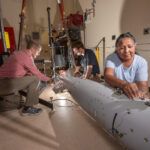Holdren brings science back to the White House
By Jeffrey Boutwell | July 9, 2009
In December 1995, on a chilly winter’s day in Oslo, John Holdren delivered an eloquent Nobel Peace Prize acceptance speech on behalf of the Pugwash Conferences on Science and World Affairs. For the first time in its 95-year history, the Nobel Peace Prize had been awarded jointly to an organization, Pugwash, and to an individual, Joseph Rotblat, Pugwash’s co-founder and then-president. Coincidentally, Holdren, who attended his first Pugwash meeting in the early 1970s and was chair of the Pugwash Council Executive Committee from 1987 to 1997, had developed an incredible bond with Rotblat over the years and remained devoted to him until Rotblat’s death in August 2005.
Fast forward to this April and a meeting Holdren held with the Pugwash leadership–President Jayantha Dhanapala, Secretary General Paolo Cotta-Ramusino, and myself–shortly after he assumed his new duties as science adviser to President Barack Obama and director of the White House Office of Science and Technology Policy. In a rich tradition of Pugwash-linked presidential science advisers going back to George Kistiakowsky (under President Dwight D. Eisenhower) and Jerome Wiesner (under President John F. Kennedy), Holdren expressed great optimism about the positive role that science and technology will play in the Obama administration’s policies. Whether helping fuel economic recovery, utilizing renewable energy sources on a far greater scale, unlocking new discoveries in medicine and the biosciences, or constraining (and ultimately, eliminating) nuclear weapons, the scientific and technical communities (including Pugwash) will be at the forefront of shaping policies that maximize the benefits of science and technology for all.
Throughout the globe, there is renewed hope and optimism that progress can be made toward a nuclear-weapon-free world. In his joint April communiqué with Russian President Dmitry Medvedev and his Prague speech a few days later, Obama committed himself to reducing U.S. and Russian nuclear arsenals through a new, verifiable START agreement, U.S. ratification of the Comprehensive Test Ban Treaty (CTBT), and a Fissile Material Cutoff Treaty. These and other actions would certainly improve the prospects for a successful Nuclear Non-Proliferation Treaty Review Conference in 2010, which is crucially important after years of decay in the foundations of the nonproliferation regime.
But optimism must be translated into results, and the Senate’s advice and consent to the CTBT isn’t a foregone conclusion. At least eight Republican votes for ratification will be needed. It would be a Faustian bargain if those votes were secured with any quid pro quo that involves the Reliable Replacement Warhead Program. In fact, the international community more than likely would reject such a deal as undermining the very purpose of the CTBT.
Even assuming the United States ratifies the CTBT, that is only the first step. The eight other countries (China, Egypt, India, Indonesia, Iran, Israel, North Korea, and Pakistan) whose signature and/or ratification are necessary for the treaty to enter into force and be implemented also must be convinced to sign on. As perhaps the only international nongovernmental organization with credible, long-standing contacts in all of these countries, Pugwash is well positioned to make this happen. Even as the U.S. ratification process and other international negotiations proceed, Pugwash will be working, as it often has, on the “steps after next” (as Rotblat often phrased it) to ensure the long-awaited total ban on nuclear weapons testing.
In the recently concluded 58th Pugwash Conference held in the Netherlands, the Pugwash Council issued a statement noting, “Recent statements by many senior political leaders and others around the world calling for a nuclear-weapon-free world are surely welcomed, and give credence to a goal that Pugwash has espoused for more than 50 years.”
There is growing broad-based political support, from liberals and conservatives, on all continents, for the zero nuclear weapons goal. And now Obama–president of the first country to develop nuclear weapons and the only country to use them in war–has declared, “The United States has a moral responsibility to act . . . to seek the peace and security of a world without nuclear weapons.” In this vein, the upcoming U.S. Nuclear Posture Review will be vitally important in implementing fundamental changes in U.S. military policy that reduce the role of nuclear weapons and more largely, devalue nuclear weapons around the world.
Undoubtedly, incremental steps toward zero will be necessary. But this shouldn’t obscure the fact that it will be unacceptable to consent to anything less than a total commitment to declaring nuclear weapons illegal and immoral and eliminating these weapons completely. This goal needs to be realized as expeditiously as possible because, as the Pugwash Hiroshima Declaration in 2005 noted, as long as nuclear weapons exist, they will be used one day.
In the many years that they worked together, Holden and Rotblat talked and wrote often of the desirability and feasibility of moving toward a nuclear-weapon-free world. Somewhere, Rotblat is smiling, delighted in the position that Holdren holds and confident that his lifelong optimism about the innate goodness and wisdom of humanity can ultimately be realized in the goal he worked for unrelentingly–the complete abolition and elimination of nuclear weapons.
Together, we make the world safer.
The Bulletin elevates expert voices above the noise. But as an independent nonprofit organization, our operations depend on the support of readers like you. Help us continue to deliver quality journalism that holds leaders accountable. Your support of our work at any level is important. In return, we promise our coverage will be understandable, influential, vigilant, solution-oriented, and fair-minded. Together we can make a difference.
Topics: Nuclear Weapons, Opinion















